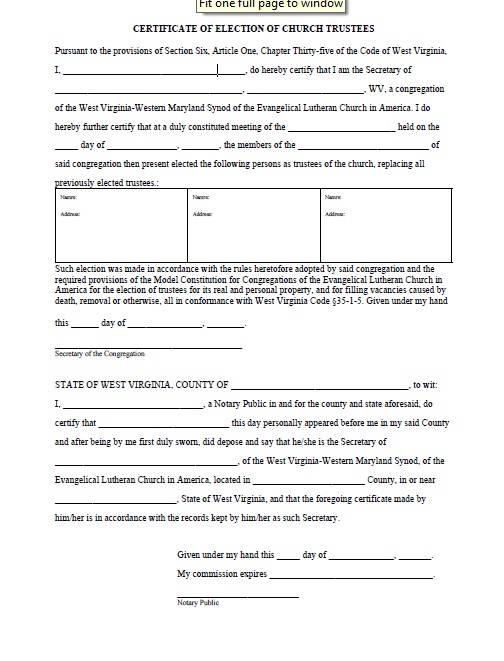West Virginia - Western Maryland Synod
This page is not intended as a definitive guide to
selling church real estate. A congregations should contact
its solicitor and/or real estate agent for detailed
information, especially with respect to deed and title,
liens, reversion clauses, and any applicable laws.
This page does address polity matters affecting the sale
of church real estate.
Common ELCA Polity
Assuming your congregation's constitution
conforms to the Model Constitution for Congregations
of the Evangelical Lutheran Church in America—check
your congregation's constitution to be sure it does—you
will find the following required provision.
*C5.03(i) [Only such authority as is delegated to the Congregation Council or other organizational units in this congregation’s governing documents is recognized. All remaining authority is retained by this congregation. This congregation is authorized to:] sell, mortgage, lease, transfer, or otherwise dispose of its property by any lawful means.
Depending upon the age of your constitution, the
numbering may be slightly different. If your congregation
does not have this provision, contact the Synod Office.
The Model Constitution also includes the
following recommend provision.
C12.05(b). The Congregation Council shall not have the authority to buy, sell, or encumber real property unless specifically authorized to do so by a meeting of this congregation.
As C12.05(b) is not a required provision, your
congregation's constitution may or may not include this
provision.
| If your congregation has *C5.03(i)
but does not have C12.05(b) or anything of
similar effect... |
If your congregation has *C5.03(i)
and does have C12.05(b) or something of similar
effect... |
| Only the Congregation Meeting can act
on the sale of Church real estate. |
The Congregation Council can act on
the sale of Church real estate within the parameters
set by the Congregation Meeting. If the Congregation Meeting has not authorized the Congregation Council to act on its behalf, only the Congregation Meeting can act on the sale of Church real estate. |
Special WV Issue
WV is the only state in the union that prohibits the
incorporation of congregations. Some few congregations may
have incorporated during the short window in which the
Secretary of State was permitting the incorporation of
congregations. For those WV congregations that are not
incorporated (which should be most), Chapter 35, Article 1, of the West
Virginia Code governs sale of church real
estate. Congregational leadership should review the
article.
WV Congregations: Electing/Appointing and Filing Your Trustees with the County
For said congregations, trustees will be required. We
traditionally recommend three trustees. These can be
elected/appointed by whatever mechanism is outlined in
your congregation's governing documents.
You will find under §35-1-5 of the West Virginia Code the material related to appointment and removal of trustees. Under §35-1-6 you will find the material related to properly recording trustees at your local office of the clerk of the county court. For your convenience, we've provided a form that should be acceptable to most clerks of the county court: download the form here.
Trustees Act at the Direction of the Congregation Meeting and/or Congregation Council
Trustees act at the direction of the Congregation Meeting
and/or Congregation Council. this is outlined in §35-1-9
of the West Virginia Code.
Advice
It is advisable to periodically review your filing of
trustees. If there is a possible sale of church real
estate in the congregation's future (whether it is land
that the church building sits on, a house or other
property inherited by the congregation, or some other
piece of real estate), being sure that all your trustees
are still alive, members of the congregation, competent,
and available to sign the required instruments to complete
the sale is a very good idea.
304-363-4030 + Porter@WV-WMD.org
